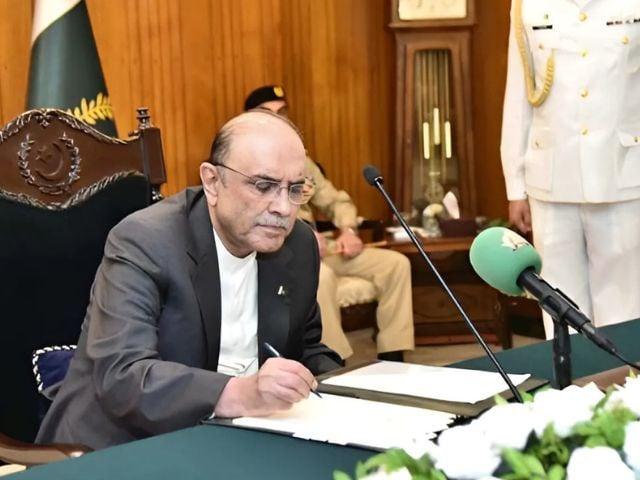Pakistan President Asif Ali Zardari decided to delay the signing of the controversial prevention crime law following the concerns raised by journalists.
The Parliamentary Association of Journalists (PRA) expressed its opposition to the PECA Act through Maulana Fazlur Rehman, who contacted the president. He urged the president to delay the signature of the bill until the journalists’ concerns were adequately discussed, Express News reported.
Sources indicate that President Asifi Ali Zardari delayed the bill for a while at the request of Maulana Fazlur Rehman, agreeing not to sign the bill for modifying PECA until the concerns of journalists are treated.
According to sources, Maulana Fazlur Rehman informed the PRA of his communication with the president concerning the bill, Express News reported.
Sources also mention that discussions between Federal Interior Minister Mohin Naqvi and journalist organizations are underway before signing the PECA law, and a meeting between the Minister of the Interior Mohin Naqvi and the Parliamentary Reporter Association Association is expected soon.
Meanwhile, the Pakistan Peoples’ Party (PPP) said that he did not know the lack of consultation on the 2025 bill (PECA) on the controversial prevention of electronic crimes (amendment).
PPP vice-president Sherry Rehman, chatting with Islamabad journalists, said on Tuesday that all stakeholders would be taken on board, “what can see him did not happen”. She assured journalists for the support of her party to support the amendments to this law proposed by the media bodies.
PPP president Bilawal Bhutto Zardari also expressed the same concerns as Sherry, declaring that this would have been better for this legislation if journalists’ organizations had been consulted to forge a consensus.
Earlier, the joint action committee of media bodies organized a protest demonstration on Tuesday before the Karachi Press Club in response to a call from the Pakistan Federation of the Union of Journalists (PFUJ) against a recent amendment to Pakistan Electronic Crimes Act (PECA).
Representatives of various media organizations, civil society groups, unions, lawyers and teachers joined and supported the demonstration.
PECA, a law promulgated in 2016, was adopted by lower and superior houses, aimed at approaching cybercrime and regulating electronic communication in Pakistan. It was intended to combat online offenses such as hacking, data theft and cyberbullying. Many journalists and media organizations have raised concerns about his implications for press freedom and freedom of expression.
“The government must learn the lessons because it was used previously against the same party, which had adopted the law in a hurry,” said Mazhar Abbas, a main member of Pfuj.
What is Peca?
The Pakistani government is strengthening the law on the prevention of electronic crimes (PECA) with new amendments to combat false news and illegal online content. The 2025 law proposed on the prevention of electronic crimes (amendment) introduces serious sanctions, including up to three years in prison and RS2 million fines for the distribution of disinformation.
A key provision is the creation of a digital rights protection authority (DRPA) responsible for regulating social media platforms and deleting illegal content.
DRPA will have powers to investigate complaints, delete content and apply digital ethics. The changes also redefine social media platforms and oblige the conformity of social media companies, which may require the registration and appointment of local representatives.
While supporters believe that changes are essential to fight against false news and hatred speeches, criticism warns against potential censorship and abusive use.




